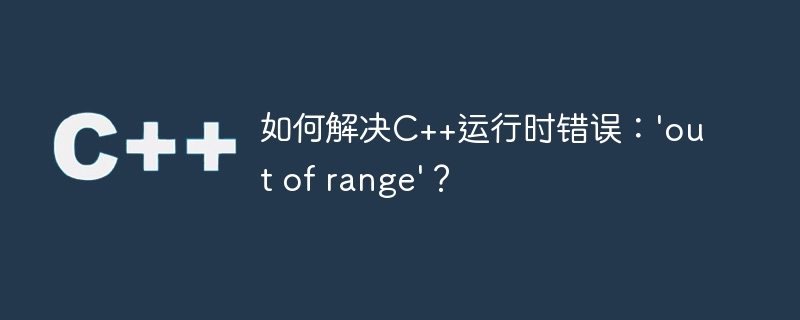

How to solve C runtime error: 'out of range'?
In C programming, when we use data structures such as arrays, containers, or strings, we often encounter a common runtime error, that is, 'out of range'. This error is usually triggered by accessing an element outside the valid index range. In this article, we'll cover some common causes and solutions to help you better understand and resolve this issue.
#include <iostream>
#include <vector>
int main() {
std::vector<int> numbers = {1, 2, 3};
// 错误示例:访问超过容器范围的索引
int index = 3;
std::cout << numbers[index] << std::endl;
return 0;
}In the above example, we defined a vector container with 3 elements and then tried to access the element with index 3. Since the container only has 3 elements, the valid index range is 0 to 2, so accessing the element with index 3 exceeds the valid range and will trigger an 'out of range' error.
To avoid this error, we should always ensure that the index is within the valid range. You can check whether the index is valid by using conditional judgment, or use an iterator to traverse the container elements.
#include <iostream>
#include <vector>
int main() {
std::vector<int> numbers = {1, 2, 3};
// 错误示例:索引计算错误
for(int i = 0; i <= numbers.size(); i++) {
std::cout << numbers[i] << std::endl;
}
return 0;
}In the above example, we used a wrong index calculation method. In the loop, we use the condition i <= numbers.size() to determine whether the loop continues to execute. Since the index starts counting from 0, and numbers.size() returns the number of elements, the condition should be i < numbers.size().
In order to avoid this error, we should carefully check the way the index is calculated to ensure that the calculation result is correct and does not exceed the valid range.
#include <iostream>
#include <string>
int main() {
std::string str = "Hello";
// 错误示例:字符串操作错误
std::cout << str.substr(0, 10) << std::endl;
return 0;
}In the above example, we used the substr() function of string to obtain a substring. However, our interception range exceeds the length of the original string and will trigger an 'out of range' error.
To avoid this error, we should always ensure that the parameters of string operations are within the correct range. You can use the length() function to get the length of the string, and then perform corresponding operations.
When troubleshooting 'out of range' errors, the most important thing is to double-check your code to ensure that both index calculations and operations are within a valid range. In addition, using debugging tools and techniques is also an effective way to find and locate problems. By understanding these common error causes and solutions, we can better avoid and solve 'out of range' errors in C, and improve the stability and reliability of the program.
The above is the detailed content of How to solve C++ runtime error: 'out of range'?. For more information, please follow other related articles on the PHP Chinese website!
 What are the differences between c++ and c language
What are the differences between c++ and c language
 Recommended learning order for c++ and python
Recommended learning order for c++ and python
 Cost-effectiveness analysis of learning python and c++
Cost-effectiveness analysis of learning python and c++
 Is c language the same as c++?
Is c language the same as c++?
 Which is better to learn first, c language or c++?
Which is better to learn first, c language or c++?
 The difference and connection between c language and c++
The difference and connection between c language and c++
 C++ software Chinese change tutorial
C++ software Chinese change tutorial
 Cost-effectiveness analysis of learning python, java and c++
Cost-effectiveness analysis of learning python, java and c++




